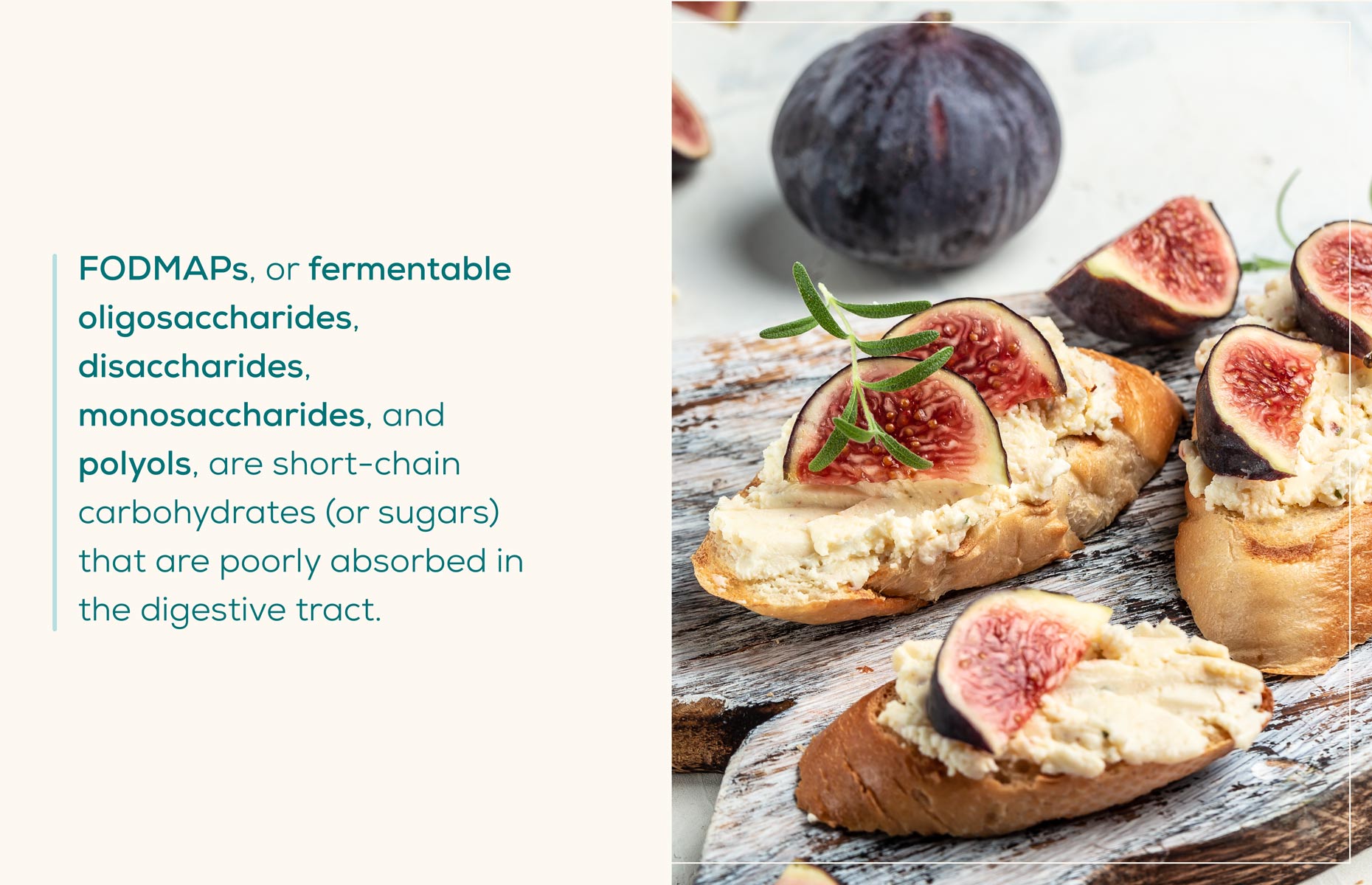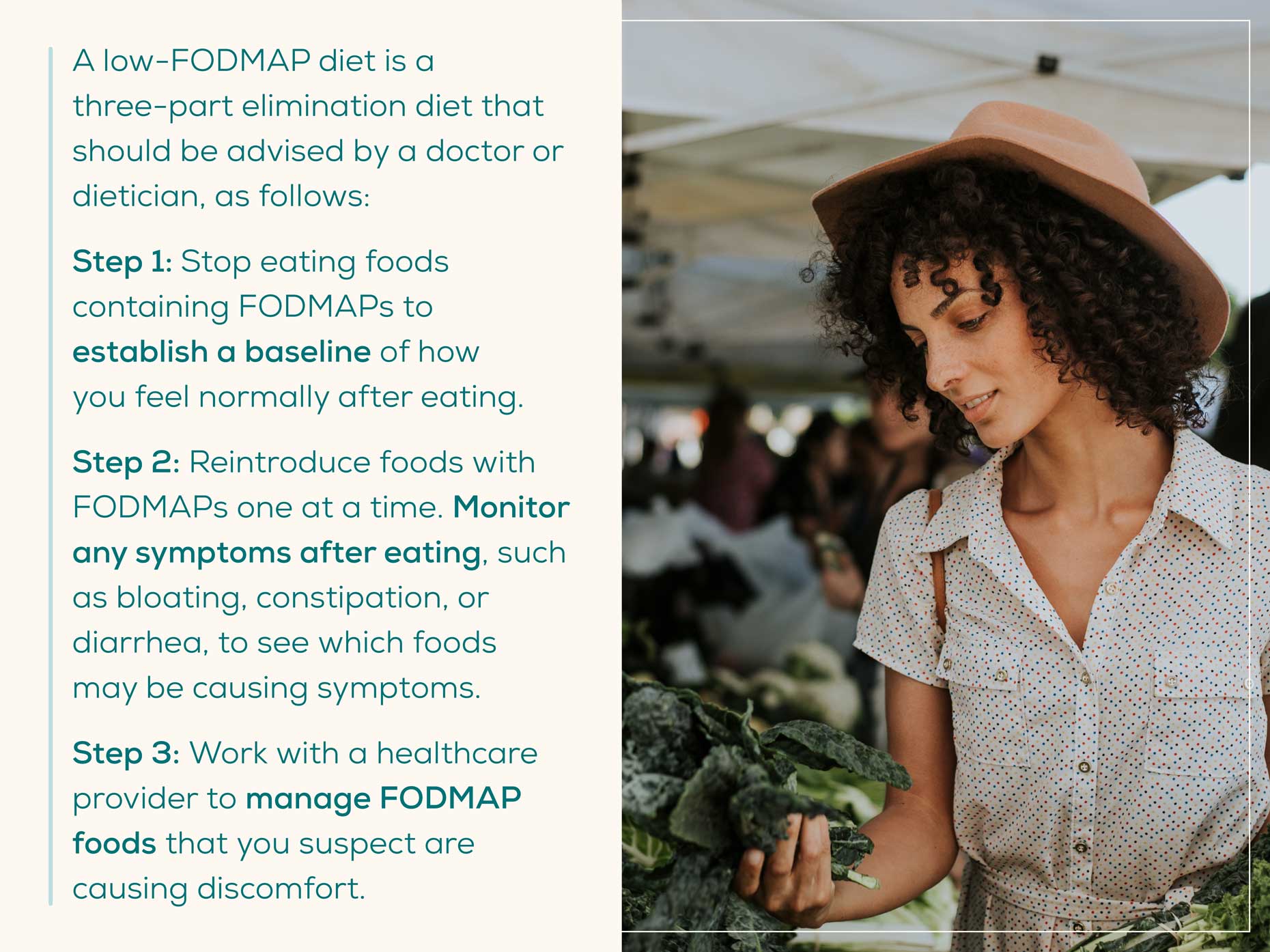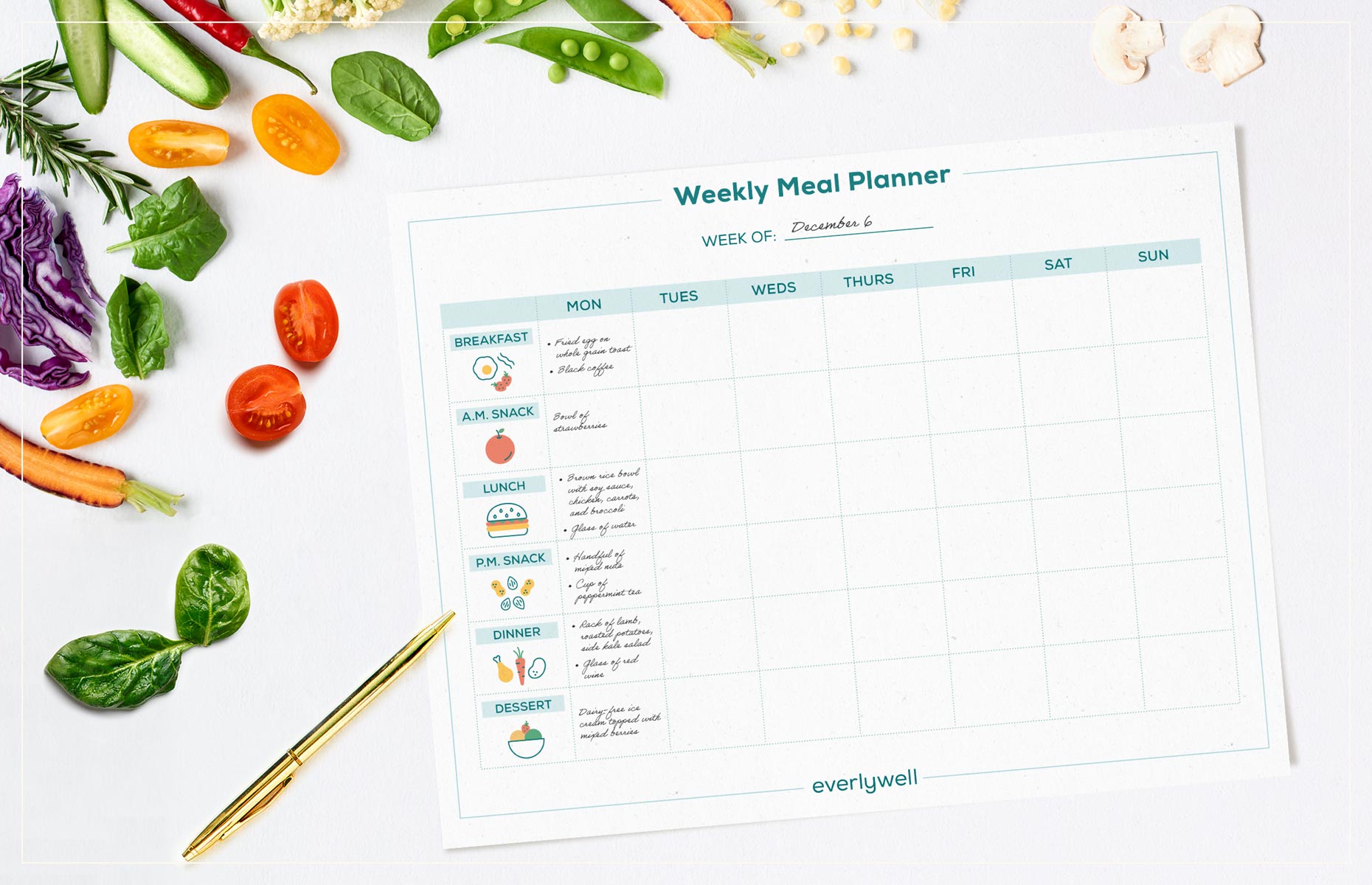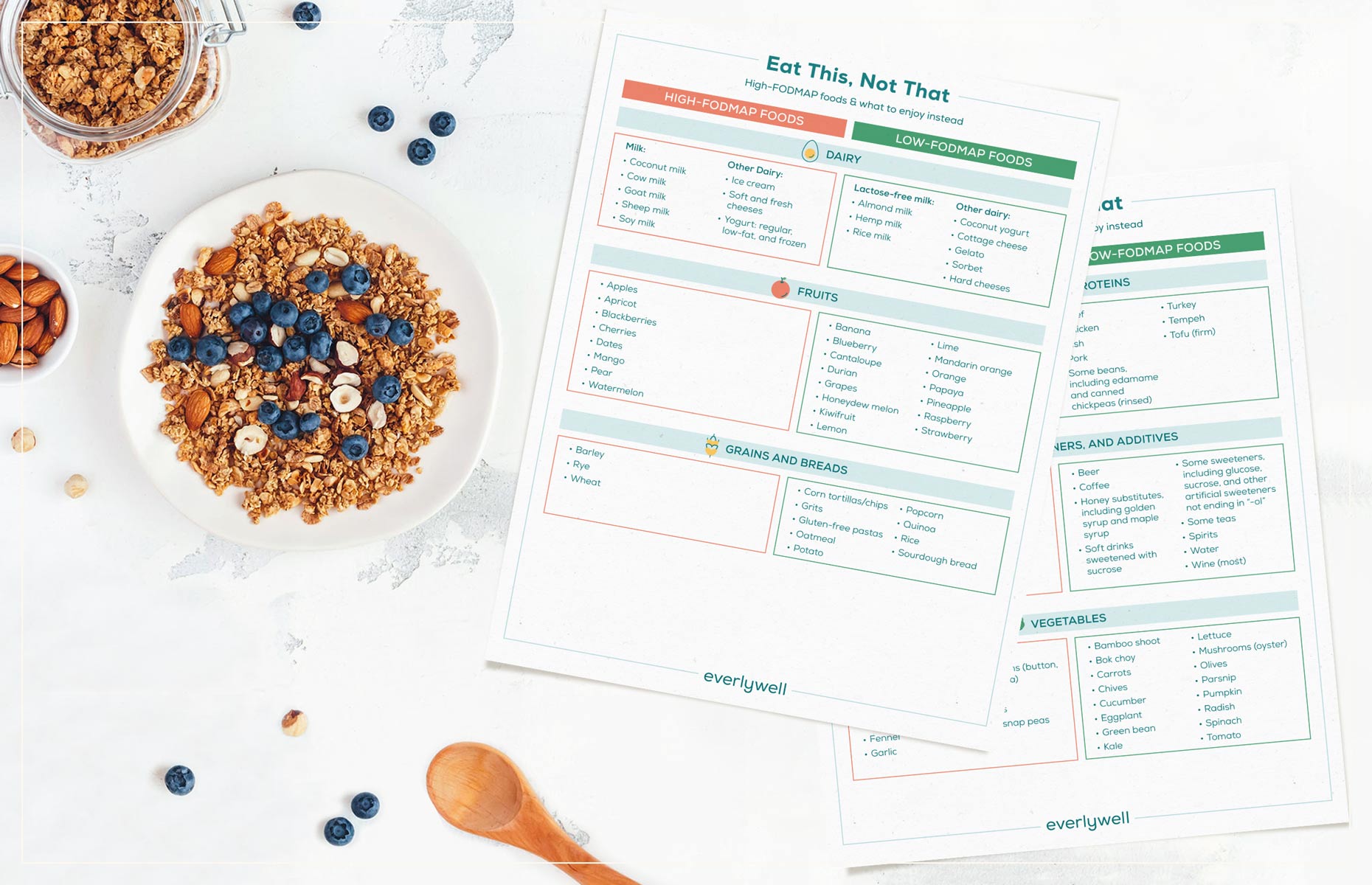
Low-FODMAP Diet Guide + Printable PDF Chart
The low-FODMAP diet is a short-term elimination diet that can potentially offer relief to people suffering from irritable bowel syndrome (IBS). By systematically eliminating and then reintroducing FODMAPs, some people are able to identify which FODMAPs cause them symptoms, giving them the ability to better decide which foods to eat and to avoid.
Read on for more information on what a low-FODMAP diet entails and how to get started with one with a doctor’s guidance.
What Is FODMAP?
FODMAPs, or fermentable oligosaccharides, disaccharides, monosaccharides, and polyols, are short-chain carbohydrates (or sugars) that are poorly absorbed in the digestive tract. According to the American College of Gastroenterology, “FODMAPs are not unhealthy or harmful, but may exacerbate GI symptoms in those with sensitive GI tracts.”
FODMAPs reach the far end of your small intestine rather than being absorbed into your bloodstream, where much of your gut microbiota reside. The bacteria in your gut that feed on FODMAPs then release gas into your intestine, which can cause digestive symptoms in certain individuals.
FODMAPs can be found in a variety of foods, such as wheat, most beans, and cow’s milk.
| FODMAPs explained | |
|---|---|
| Fructans | A polymer of fructose molecules, found in many grains such as barley, wheat, and rye |
| Fructose | A simple sugar present in many fruits and vegetables that also makes up the base for many added sugars |
| Galactans | An oligosaccharide containing chains of the sugar galactose, present in many legumes |
| Lactose | A sugar found in cow's milk and other dairy products |
| Polyols |
|
Some people, including those who experience irritable bowel syndrome (IBS) or small intestinal bacterial overgrowth (SIBO), may have trouble digesting foods that contain FODMAPs, though general sensitivity differs from person to person.
FODMAPs may contribute to a variety of symptoms for some individuals, including:
- Bloating
- Constipation
- Cramping
- Diarrhea
- Gas or flatulence

How Does a Low-FODMAP Diet Work?
Eating FODMAPs can result in discomfort and digestive distress for some people, and a low-FODMAP diet may be helpful.
A low-FODMAP diet is not a permanent dietary solution, and is instead a three-part elimination and add-back diet, where you slowly add back foods containing FODMAPs to see what foods you have reactions to.
Low-FODMAP diets are broken into three parts, as follows:
- Step 1: Stop eating foods containing FODMAPs to establish a baseline of how you feel normally after eating.
- Step 2: Reintroduce foods with FODMAPs one at a time. Monitor any symptoms after eating, such as bloating, constipation, or diarrhea, to see which foods may be causing symptoms.
- Step 3: Work with a healthcare provider to manage FODMAP foods that you suspect are causing discomfort.
It’s not recommended to try this diet without first consulting a dietitian or your healthcare physician. They can help you decide if this diet is right for you and guide you through the stages of this dietary strategy.

Who Is Low-FODMAP Not Recommended For?
While low-FODMAP diets may help those with preexisting gastrointestinal conditions, not everyone will be a fit for this elimination diet strategy. If you fall into the below categories, the low-FODMAP diet may not be right for you, and you may want to speak with your doctor about this dietary strategy:
- History of varied medical needs
- Past or present disordered eating
- Risk of malnourishment
What Foods Can You Eat?
After speaking with a doctor or dietitian and determining if a low-FODMAP diet is right for you, you may be wondering how to keep up with all the various foods you can and can’t eat on a low-FODMAP diet.
You should consult with your doctor or dietitian on what foods you should and shouldn’t eat, as low-FODMAP diets will look different for everyone depending on what triggers symptoms for you, as well as any other dietary restrictions (such as allergies) you may have.
Low-FODMAP diets call for you to eat less fructans (found in grains like wheat and rye), fructose (found in sweeteners like honey and agave), galacto-oligosaccharides (found in most beans as well as lentils), polyols (such as sweeteners like xylitol and mannitol), and lactose (found in products produced with cow’s milk, like some cheeses and sour cream).

You can then eat foods that are considered to be low-FODMAP, like dairy-free items, certain fruits and vegetables, and certain whole grains and gluten-free foods. You can consult the low-FODMAP diet chart below for a more in-depth look at what high-FODMAP foods look like, and what low-FODMAP foods to eat instead. Certain foods can also be low- or high-FODMAP depending on the serving size.
Once you’ve found the foods that work well for you, try our weekly meal planner printable for an easy way to keep track of what you’ll be eating.
Low-FODMAP Diet Chart
To remember what you should (and shouldn’t) eat while on a low-FODMAP diet, consider downloading our low-FODMAP diet chart. You can keep it on your fridge, in your wallet, or downloaded on your phone as an easy guide of what to enjoy and what to avoid when on a low-FODMAP diet.
Benefits of a Low-FODMAP Diet
For those with IBS, SIBO, and other GI issues, low-FODMAP diets may provide relief from symptoms of gastrointestinal distress, which may help you feel more in control of your body and how you feel on a day-to-day basis. Though the exact benefits of participating in a low-FODMAP diet will differ from person to person, there are some common benefits. According to research on the diet’s efficacy, up to 86% of people with IBS see improvements with their symptoms after adhering to the low-FODMAP diet.
Positive Effects on Mental Health
Experiencing gastrointestinal issues such as IBS may not only be embarrassing or awkward, but can have many negative side effects on mental and physical health. A 2014 study found that IBS may be associated with heightened anxiety, poor quality of life, and a negative impact on work and other social experiences.
Eating foods that may help regulate gastrointestinal issues may provide much sought-after symptom relief, which may help those experiencing issues regain control over social situations and your overall quality of life, which may in turn improve mental health.
Symptom Relief
One of the biggest benefits of participating in a low-FODMAP diet is the possibility of relief from symptoms related to gastrointestinal issues that some may experience. Some of these symptoms, such as diarrhea or cramping, can be debilitating, so having relief may provide a world of difference. Studies have shown promising improvements for many people with IBS who are following a low-FODMAP diet.
The most common symptoms that can improve with a low-FODMAP diet are bloating and abdominal pain, but issues related to fatigue and bowel movements may improve as well. Doctors or dietitians can help guide you through a low-FODMAP diet and see if it would be best for you.
References
“Low-Fodmap Diet.”. American College of Gastroenterology, 31 Jan. 2022. Accessed 4 February 2022.
“Try a Fodmaps Diet to Manage Irritable Bowel Syndrome.”. Harvard Health, 17 Sept. 2019. Accessed 4 February 2022.
Veloso, Hazel Galon. “FODMAP Diet: What You Need to Know.”. Johns Hopkins Medicine. Accessed 4 February 2022.
Nanayakkara, Wathsala S, et al. “Efficacy of the Low Fodmap Diet for Treating Irritable Bowel Syndrome: The Evidence to Date.”. Clinical and Experimental Gastroenterology, Dove Medical Press, 17 June 2016. Accessed 4 February 2022.
Fadgyas-Stanculete, Mihaela, et al. “The Relationship between Irritable Bowel Syndrome and Psychiatric Disorders: From Molecular Changes to Clinical Manifestations.”. Journal of Molecular Psychiatry, BioMed Central, 27 June 2014. Accessed 4 February 2022.
Magge, Suma, and Anthony Lembo. “Low-FODMAP Diet for Treatment of Irritable Bowel Syndrome.”. Gastroenterology & Hepatology, Millennium Medical Publishing, Nov. 2012. Accessed 4 February 2022.



